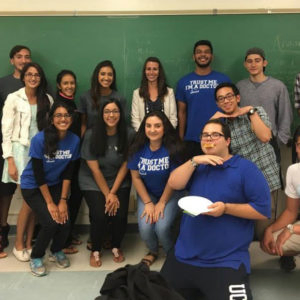Sample MCAT Question - Types of Memory Storage
What type of memory is involved when grabbing a specific object out of one’s pocket?
a) Iconic memory
b) Echoic memory
c) Haptic memory
d) Visuo-spatial sketchpad
Get 1-on-1 MCAT Tutoring From a Specialist
With MCAT tutoring from MedSchoolCoach, we are committed to help you prepare, excel, and optimize your ideal score on the MCAT exam.
For each student we work with, we learn about their learning style, content knowledge, and goals. We match them with the most suitable tutor and conduct online sessions that make them feel as if they are in the classroom. Each session is recorded, plus with access to whiteboard notes. We focus on high-yield topics if you're pressed for time. If you have more time or high-score goals, we meticulously cover the entire MCAT syllabus.
Types of Memory Storage for the MCAT
Memory is a fascinating cognitive phenomenon that shapes our daily experiences, learning capabilities, and overall understanding of the world. For the MCAT, there are four key types of memory storage systems you need to know: sensory memory, working memory, short-term memory, and long-term memory.
Our sensory memory stores sensory information for an extremely short period of time. Our working memory serves as a "mental workspace", allowing us to hold and manipulate information in real-time. Short-term memory acts as a temporary storage system, bridging the gap between sensory input and long-term retention. Lastly, long-term memory forms the vast repository of knowledge, experiences, and skills that shape who we are. In this article, we will delve into all four types of memory and what you need to know about each for the MCAT.
Sensory Memory
Sensory memory is the storage of sensory information after sensory perception for a very short period of time. This type of memory only lasts for between a few milliseconds to a few seconds and can be further subdivided into iconic memory for visual sensory information, echoic memory for auditory sensory information, and haptic memory for touch sensory information. Note that iconic memory is extremely short and echoic memory lasts slightly longer than iconic memory.
Working Memory
Working memory is the cognitive system for holding and processing a limited amount of information. For example, basic math calculations, or deciding what to order off a menu at a restaurant. The MCAT expects you to understand Baddeley's model of working memory. Baddeley's model postulates that there are four components of working memory: the Episodic Buffer integrates information from long-term and working memory; the Visuospatial Sketchpad manages visual information; the Phonological Loop manages auditory information; and the Central Executive serves to coordinate the other three components of working memory.
Short-Term Memory
Short-term memory is the cognitive system for holding but not manipulating a limited number of chunks of information for a period of several seconds. In contrast to working memory, short term memory deals only with holding and retaining information, not manipulating information. In more specific terms, the average person's short term memory capacity is 4 ± 2 chunks of information.
Note, that the older school of thought held that the average short term memory capacity was 7 ± 2 chunks of information, but more recent studies show otherwise. For instance, if you wanted to remember a long number (such as 321,234,542,129) you would break it down into smaller chunks to remember in your short term memory (for instance, 321 would be one chunk, 234 would be the next, etc).
Long-Term Memory
Long-term memory is the storage of an unlimited amount of information for an indefinite period of time. It contains information that you are able to recall at any point in time. This includes explicit and implicit memories.
Explore More
MCAT Masterclass Chapters
Take a closer look at our entire MCAT Masterclass or explore our lessons below.
-
Explicit and Implicit Memory
View Subject -
Anterograde & Retrograde Memory - MCAT Psychology
View Subject -
Semantic Networks & Spreading Activation - MCAT Psychology
View Subject -
Types of Sensory Receptors - MCAT Psychology
View Subject -
Adler & Individual Psychology - MCAT Psychology
View Subject -
Operant Conditioning: Token Economy - MCAT Psychology
View Subject




